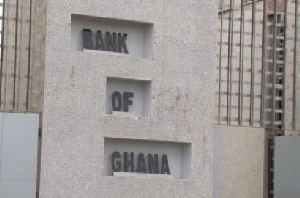 A BoG report shows that the private sector accounted for greater proportion of banks
A BoG report shows that the private sector accounted for greater proportion of banks
Delay by government in paying companies for projects done on its behalf and half a decade of power rationing are largely responsible for the high impairments of loans advanced by banks to the private sector, financial analysts have argued.
The Bank of Ghana Banking Industry report, June 2017, shows that the private sector, which was the largest recipient of outstanding credit balances, accounted for the greater proportion of banks’ NPLs.
The share of private sector NPLs in the total industry NPLs increased from 87.3 percent in June 2016 to 94.9 percent in June 2017 while the proportion of banks’ NPLs attributable to the public sector declined from 12.7 percent to 5.1 percent over the same period.
Dr. Richard Atuahene, a corporate governance specialist and CEO of Universal Capital Management Ltd, argues that government and the banks have a key role to play in addressing this menace.
“The link between the private sector and the government is very high. Government does many projects through the private sector and pays later. And the private sector finances their projects through loans. So there is a correlation between high NPLs and government’s inability to pay.
If government pays all the oil debt, the NPLs will come down; if government pays all the GET Fund, the NPLs will come down; if government pays all the NHIL debt, the NPLs will come down,” he told B&FT in an interview.
He added that: “Also, the banks inability to understand businesses and their work complexities is also part of the rise in NPLs in the private sector.
For example, some few years ago, 17 banks went into cocoa syndication loan with Finatrade, and were given guarantees by COCOBOD, and the business failed. The question is, did those banks that went into cocoa have knowledge about financing cocoa? No. So the banks must build competencies about projects they want to finance.”
The BoG report further indicates that most private sector non-performing loans were debts of indigenous enterprises accounting for 77.2 percent of total NPLs in June 2017, from 73 percent in June 2016.
The report adds that the three largest sectors in terms of outstanding credit balances, namely, the Commerce & Finance, the Services and the Electricity, Gas & Water sectors, accounted for 63.6 percent of total NPLs in June 2017 compared with a share of 65.7 percent in June 2016.
The share of NPLs attributable to the Commerce & Finance sector (the sector accounting for the largest share of NPLs) declined from 42.4 percent in June 2016 to 36.8 percent in June 2017.
The report added that the Agriculture, Forestry & Fishing sector was, however, the sector with the highest proportion of its loans (39.3 percent) being classified as non-performing as at end-June 2017. It was followed closely by the Commerce & Finance Sector with a sectoral NPL ratio of 30.3percent.
This, Dr. Atuahene opines that the energy crisis that reached its peak in 2015 can be partly blamed for it.
“When the energy crisis came in 2014, 2015, it had great impact on businesses. For example, if you take cold stores in Ghana, they had to buy standby generators before they could operate. Cold store business must have 24/7 electricity before they can operate, and so they had to buy a good generator and fuel it in addition. All these increased the cost of operations for many businesses and affected the performance of such businesses,” he said.
The same view is shared by Professor of Economics at the University of Ghana, Peter Quartey, who maintains that businesses have not fully recovered from the energy crisis.
“The power shortfall we experienced some few years ago really affected businesses. Many businesses have still not fully recovered from this economic challenge and that is really affecting their loan repayment,” he told B&FT in an interview.